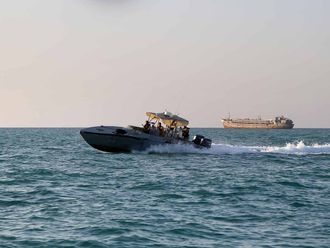Baghdad: US troops yesterday detained two suspected weapons smugglers who may be linked to Iran's elite Quds force, the military said.
The suspects and a number of weapons were seized during a raid on a rural farm compound in eastern Iraq, near the Iranian border, according to a military statement.
"The suspects may be associated with a network of terrorists that have been smuggling explosively formed projectiles (EFPs), other weapons, personnel and money from Iran into Iraq," the military said, referring to powerful, armor-piercing roadside bombs that have killed hundreds of US soldiers in recent months.
In the continued violence, five Sunni tribal leaders opposed to Al Qaida were killed when a suicide bomber drove a minivan packed with about half a tonne of explosives into a house north of Baghdad yesterday, police said. The Sunni tribal leaders were meeting in an area known as Jurf Al Milih near Taji, about 20km north of the Iraqi capital, to discuss joining US and Iraqi forces in fighting Al Qaida in their mainly Sunni Arab area. A police source said the preliminary death toll of five could rise. Another 12 people were wounded.
Oil law
Two prominent Iraqi legislators, meanwhile, said prospects were dim for reaching an agreement on a US-backed draft oil law before parliament adjourns for an August vacation.
American officials have been pressing Prime Minister Nouri Al Maliki and parliament to pass laws that Washington considers crucial to Iraq's stability and the debate on how long US forces should remain, including one on the fair distribution of the country's oil wealth.
But Mahmoud Othman, a Kurd, and Abbas Al Bayati, a Shiite Turkoman, said the oil law was not likely to be debated by parliament before September because political leaders have been unable to agree on the legislation.
"There must first be political consensus between the major blocs on the law but there is not enough time for this to be done before the August break," said Al Bayati, a member of the United Iraqi Alliance, the largest Shiite bloc in the 275-seat house.
The oil law, approved by Al Maliki's Cabinet but not sent to parliament because of major opposition, calls for a fair distribution of the income from Iraq's massive petroleum resources among Shiites, Kurds and Sunnis.
Appeal to cancel vacation
Sunnis, who make up the bulk of the insurgency, have virtually no known oil reserves in their territories yet still oppose the current draft legislation. Kurds, who control large reserves in northern Iraq, oppose the measure because it could loosen their control over a key asset.
Al Maliki on Saturday called on parliament to cancel its monthlong vacation or at least limit it to two weeks.












